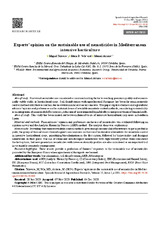Mostrar el registro sencillo del ítem
Experts’ opinion on the sustainable use of nematicides in Mediterranean intensive horticulture
| dc.contributor.author | Talavera Rubia, Miguel | |
| dc.contributor.author | Vela, María D. | |
| dc.contributor.author | Arriaza, Manuel | |
| dc.date.accessioned | 2024-04-09T09:29:28Z | |
| dc.date.available | 2024-04-09T09:29:28Z | |
| dc.date.issued | 2024 | |
| dc.identifier.uri | http://hdl.handle.net/10396/27841 | |
| dc.description.abstract | Aim of study: Root-knot nematodes are considered a common limiting factor to reaching premium quality and economically viable yields in horticultural crops. Soil disinfestation with agrochemical fumigants has been the main nematode control method until their recent ban due to environmental and social concerns. This paper explores farmers and agricultural advisors’ opinion and preferences on the sustainable use of available nematode control methods, considering sustainability as an integration of nematicidal effectiveness, reduction of environmental harmful effects and preservation of human health. Area of study: This study has been carried out between farm advisors of intensive horticultural crop areas in Southern Spain. Material and methods: Farm advisors’ opinion and preferences on the use of nematicides was evaluated following an opinion survey and the Analytic Hierarchy Process (AHP) method. The analysis done was exploratory. Main results: Providing that current available control methods give enough nematicidal effectiveness to get a profitable yield, the group of farm advisors showed a great consciousness on the use of sustainable alternatives for nematode control in intensive horticultural crops, prioritizing biosolarization as the first option, followed by biopesticides and fumigant nematicides in third place. The use of ozone and non-fumigant nematicides with high toxicity profiles were considered the last options, but new generation nematicides with lower ecotoxicity profiles are also considered as an important tool in sustainable nematode management. Research highlights: These results provide a prediction of farmers' responses to the sustainable use of nematicides promoted by the European Union when agrochemical fumigants are banned. | es_ES |
| dc.format.mimetype | application/pdf | es_ES |
| dc.language.iso | eng | es_ES |
| dc.publisher | CSIC | es_ES |
| dc.rights | https://creativecommons.org/licenses/by/4.0/ | es_ES |
| dc.source | Talavera, M; Vela, MD; Arriaza, M. (2024). Experts’ opinion on the sustainable use of nematicides in Mediter - ranean intensive horticulture. Spanish Journal of Agricultural Research, Volume 22, Issue 1, e1001. | es_ES |
| dc.subject | Biosolarization | es_ES |
| dc.subject | Soil disinfestation | es_ES |
| dc.subject | AHP | es_ES |
| dc.subject | Meloidogyne | es_ES |
| dc.title | Experts’ opinion on the sustainable use of nematicides in Mediterranean intensive horticulture | es_ES |
| dc.type | info:eu-repo/semantics/article | es_ES |
| dc.relation.publisherversion | https://doi.org/10.5424/sjar/2024221-20568 | es_ES |
| dc.rights.accessRights | info:eu-repo/semantics/openAccess | es_ES |

